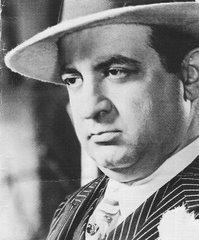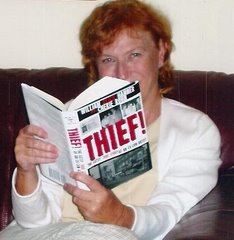Reviewing the History Behind Famous Mob Nicknames
A colorful nickname comes with the job when you are a reputed Chicago crime boss, often whether you like it or not.
The trial of Michael "Big Mike" Sarno is getting underway in federal court in Chicago, with prosecutors arguing that the 6-foot-3-inch, 300-pound Sarno wasn't just imposing because of his size, but because he was the big man behind a violent mob jewelry theft and illegal gambling ring.
Imposing aliases have captivated the public and aggravated mobsters since the days of Al "Scarface" Capone, a fact that apparently was too much for one prospective juror. The juror, a suburban businessman, told U.S. Judge Ronald Guzman he would be biased by the repeated use of nicknames during the trial. So Guzman sent him home.
Defense attorney Michael Gillespie said he's not worried about his large client's nickname, which is pretty mild for an alleged mobster. "There's nothing nefarious about that nickname," Gillespie said. "But I do think (federal prosecutors) put the nickname in there for a reason. They could've just charged him as 'Michael Sarno.'"
A big appetite is a more benign way to get a pet name than, say, Anthony "Joe Batters" Accardo, the former reputed mob kingpin who earned his sobriquet for beating people with baseball bats. The story goes that after hearing of one such beating, Capone himself said, "That guy, (Accardo), he's a real Joe Batters." Throughout his life, everyone called Accardo "Joe," said Gus Russo, author of "The Outfit."
"They started to call (Accardo) 'Big Tuna' in the press, but no one ever called him that," said Russo. Mobsters' nicknames often were generated by the press or FBI agents eager to antagonize their targets, a favorite tactic of longtime Chicago FBI chief William Roemer. "(Roemer) was the one that referred to (Outfit Vegas boss) Anthony Spilotro as 'The Ant,'" Russo said. "That was (Roemer's) way of infuriating these guys."
Attorney Joseph Lopez said the press hung the nickname "The Breeze" on his loan-sharking client Frank Calabrese Sr. "That's a media nickname. No one ever called him that. He was 'Cheech,'" said Lopez. "Cheech is 'Frank' in Italian. It's a neighborhood thing. These guys get their nicknames like anyone else, as young kids in the neighborhood."
Of course, former Lopez client Anthony "The Hatchet" Chiaramonti was known for attacking juice-loan delinquents with a hatchet, the attorney acknowledged. "Hatchet earned that nickname," said Lopez, noting that jurors heard Chiaramonti strangle an informant — who was wearing a wire at the time — during a trial in the 1990s. "I called him Tony."
When reputed mobsters deny, or take offense to, their nicknames, it may be because they haven't heard them until someone plays them tapes of a wiretap. Wiretaps in Sarno's case will show that some of his lieutenants often called their boss "Fat Ass" behind his back. Not a good career move in most jobs, and a potentially deadly one in The Outfit.
"These are not guys you might want to call by a nickname to their face," said Markus Funk, one of the lead prosecutors in the Family Secrets trial that featured defendants Frank "the German" Schweihs; Paul "the Indian" Schiro; and Joseph Lombardo, who was listed with three nicknames: "the Clown," "Lumbo" and "Lumpy."
U.S. attorney's office policy is to include nicknames in an indictment only when the monikers are used in wiretaps or correspondence, said former prosecutor Chris Gair. However, modern mobsters are so paranoid about wiretaps and FBI surveillance that they seldom even risk using a nickname, Gair said. Their coded euphemisms get so vague, often it's clear the mobsters can barely carry on a conversation.
"Instead of a name or a nickname, they'll say something like 'You know that guy down by Grand and Ogden (avenues)?' 'You mean the guy who stands outside the grocery?' And the circumlocutions are so obscure, it's obvious they don't know who the other guy's talking about," Gair said. "But they're so paranoid, they still won't use a name."
Gair, for the record, said he seldom used nicknames in cases he handled.
"I would almost never put (nicknames) in an indictment. FBI agents and IRS guys have a nickname for everybody," he said. "For most guys, they use nicknames the way you or I do among friends."
Thanks to Andy Grimm
The trial of Michael "Big Mike" Sarno is getting underway in federal court in Chicago, with prosecutors arguing that the 6-foot-3-inch, 300-pound Sarno wasn't just imposing because of his size, but because he was the big man behind a violent mob jewelry theft and illegal gambling ring.
Imposing aliases have captivated the public and aggravated mobsters since the days of Al "Scarface" Capone, a fact that apparently was too much for one prospective juror. The juror, a suburban businessman, told U.S. Judge Ronald Guzman he would be biased by the repeated use of nicknames during the trial. So Guzman sent him home.
Defense attorney Michael Gillespie said he's not worried about his large client's nickname, which is pretty mild for an alleged mobster. "There's nothing nefarious about that nickname," Gillespie said. "But I do think (federal prosecutors) put the nickname in there for a reason. They could've just charged him as 'Michael Sarno.'"
A big appetite is a more benign way to get a pet name than, say, Anthony "Joe Batters" Accardo, the former reputed mob kingpin who earned his sobriquet for beating people with baseball bats. The story goes that after hearing of one such beating, Capone himself said, "That guy, (Accardo), he's a real Joe Batters." Throughout his life, everyone called Accardo "Joe," said Gus Russo, author of "The Outfit."
"They started to call (Accardo) 'Big Tuna' in the press, but no one ever called him that," said Russo. Mobsters' nicknames often were generated by the press or FBI agents eager to antagonize their targets, a favorite tactic of longtime Chicago FBI chief William Roemer. "(Roemer) was the one that referred to (Outfit Vegas boss) Anthony Spilotro as 'The Ant,'" Russo said. "That was (Roemer's) way of infuriating these guys."
Attorney Joseph Lopez said the press hung the nickname "The Breeze" on his loan-sharking client Frank Calabrese Sr. "That's a media nickname. No one ever called him that. He was 'Cheech,'" said Lopez. "Cheech is 'Frank' in Italian. It's a neighborhood thing. These guys get their nicknames like anyone else, as young kids in the neighborhood."
Of course, former Lopez client Anthony "The Hatchet" Chiaramonti was known for attacking juice-loan delinquents with a hatchet, the attorney acknowledged. "Hatchet earned that nickname," said Lopez, noting that jurors heard Chiaramonti strangle an informant — who was wearing a wire at the time — during a trial in the 1990s. "I called him Tony."
When reputed mobsters deny, or take offense to, their nicknames, it may be because they haven't heard them until someone plays them tapes of a wiretap. Wiretaps in Sarno's case will show that some of his lieutenants often called their boss "Fat Ass" behind his back. Not a good career move in most jobs, and a potentially deadly one in The Outfit.
"These are not guys you might want to call by a nickname to their face," said Markus Funk, one of the lead prosecutors in the Family Secrets trial that featured defendants Frank "the German" Schweihs; Paul "the Indian" Schiro; and Joseph Lombardo, who was listed with three nicknames: "the Clown," "Lumbo" and "Lumpy."
U.S. attorney's office policy is to include nicknames in an indictment only when the monikers are used in wiretaps or correspondence, said former prosecutor Chris Gair. However, modern mobsters are so paranoid about wiretaps and FBI surveillance that they seldom even risk using a nickname, Gair said. Their coded euphemisms get so vague, often it's clear the mobsters can barely carry on a conversation.
"Instead of a name or a nickname, they'll say something like 'You know that guy down by Grand and Ogden (avenues)?' 'You mean the guy who stands outside the grocery?' And the circumlocutions are so obscure, it's obvious they don't know who the other guy's talking about," Gair said. "But they're so paranoid, they still won't use a name."
Gair, for the record, said he seldom used nicknames in cases he handled.
"I would almost never put (nicknames) in an indictment. FBI agents and IRS guys have a nickname for everybody," he said. "For most guys, they use nicknames the way you or I do among friends."
Thanks to Andy Grimm




No comments:
Post a Comment